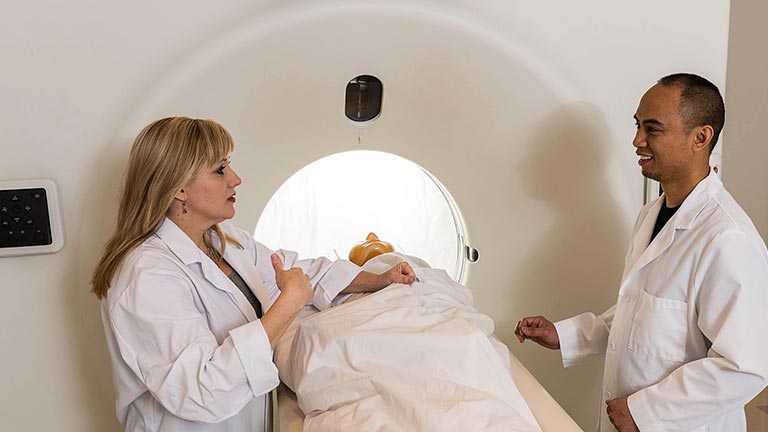The Diagnostic Medical Imaging Radiation Therapy Technology program at College of DuPage is a one-year advanced certificate program available to graduates of an accredited Radiography or Nuclear Medicine program.
Through radiation therapy courses, classroom work and clinicals, students will gain practical experience in radiation therapy. Students enrolled in the program attend full-time beginning in the fall semester with clinical experience on Mondays, Wednesdays and Fridays (full eight-hour days) and coursework at College of DuPage in Glen Ellyn on Tuesday and Thursday evenings.
The COD Radiation Therapy program incorporates the National Radiation Therapy curriculum established by the American Society of Radiologic Technologists (ASRT). The curriculum includes all didactic and clinical competencies required prepare a student to sit for the American Registry of Radiologic Technologists (ARRT) national certification examination.
Admissions Information
Prospective students must follow specific admission criteria before being admitted into the program and follow the admission checklist located in the Radiation Therapy Application Packet.
First Step to Apply - Attend an Advising Session
Determine Your Path
Radiation therapists are highly sought-after professionals who serve as liaisons between patients and their physicians and provide supportive care during radiation treatment for patients with cancer and other diseases.
Radiation therapists require a diverse set of skills necessary to participate in both current and emerging technologies in radiation oncology, as well as the ability to provide compassionate, hands-on patient care. At COD, radiation therapy students will find:
- Dedicated instructors with years of professional experience.
- Affordable courses to help you achieve success without creating overwhelming debt or draining your savings account.
- Small class sizes to ensure you receive personalized attention.
- State-of-the-art equipment used to treat cancer, giving students clinical experience needed to enter the field.
Radiation Therapy
Upon successful completion of the Radiation Therapy certificate, students are eligible to become certified by the American Registry of Radiologic Technologists and practice as Radiation Therapy Technologists. Certification is through the American Registry of Radiologic Technologists (ARRT), licensure is required for employment in the field in the state of Illinois through the Illinois Emergency Management Agency (IEMA).
Diagnostic Medical Imaging

The curriculum of the COD Diagnostic Medical Imaging programs prepares students to become job ready as a technologist in either Radiography, Sonography, Nuclear Medicine, or Radiation Therapy.
Get Started Today
The first step to getting started in the Radiation Therapy program is to review the application packet. The packet contains an admissions checklist that you will need to follow in order to be eligible for admission.
Academic and Career Pathways give you a roadmap to achieving your career goals. Follow a pathway based on your degree that outlines which classes you need to take and when so you graduate on time or move on to the next phase in your career.
Radiation Therapy program graduates will:
- Demonstrate knowledge of written and oral communication
- Demonstrate ability to maintain written records of treatment administered
- Demonstrate ability to perform mathematical calculation of treatment times and radiation doses
- Demonstrate knowledge of topographical and cross-sectional anatomy and localization of anatomical structures and treatment sites
- Demonstrate knowledge of radiation physics applied in the practice of radiation therapy technology
- Demonstrate ability to operate radiation producing equipment in all phases of treatment set-up and delivery
- Demonstrate capability of interpretation of isodose summations and treatment plans prepared by hand or by computer for the set-up of the patient and the delivery of the treatment prescription
- Demonstrate verification of correctness of delivery and provision of consistent daily treatment set-up and recognition of and corrective action taken for errors in calculation and/or delivery of a course of treatment
- Demonstrate knowledge of proper utilization of treatment accessories in the delivery of a planned treatment
- Demonstrate proper utilization of immobilization and beam directional devices
- Demonstrate proper utilization of procedures for protection from sources of radiation exposure
- Demonstrate ability to provide basic nursing care and cardio-pulmonary resuscitation
- Demonstrate ability to provide psychological support and awareness of patterns of physical and emotional stress exhibited by cancer patients
- Demonstrate ability to recognize the patient’s clinical progress, symptoms of disease progression, the complications and side-effects of a treatment course and initiation of the processes of consultation with the physician responsible for their care
- Demonstrate the proper use of body mechanics in guiding and/or assisting the patient to move to and from the standing position, wheelchair, or cart to the treatment table in a safe manner
- Demonstrate the ability to interact in a professional manner with other health care personnel involved in the treatment of the patient
Career Information
Explore careers based on your interest, location and salary range or view top occupations by income.
Frequently Asked Questions
Find answers to your frequently asked questions regarding the Radiation Therapy program.
Radiation therapists are highly skilled medical specialists educated in physics, radiation safety, patient anatomy and patient care. Radiation Therapists administer targeted doses of radiation to the patients body to treat cancer and other diseases. As the radiation strikes human tissue, it produces highly energized ions that gradually shrink and destroy the nucleus of malignant tumor cells.
Duties of radiation therapists may include reviewing prescription and diagnosis; acting as a liaison with the physician and supportive care personnel; preparing equipment, such as immobilization, treatment and protection devices; and maintaining records, reports and files. They may also assist in dosimetry procedures and tumor localization. Radiation therapists typically see their patients three to five days a week throughout a four- to seven-week treatment plan.
Members of this profession mainly work in hospitals, clinics and treatment centers under the supervision of two other medical specialists, namely medical dosimetrists and radiation oncologists, to determine how much radiation will be delivered to a tumor site, the best course of therapy and to plan a treatment.
Yes, in addition to enrolling at College of DuPage, a student must also complete a separate admissions process for this program. For details about this process, see the Radiation Therapy Admission Packet. The Radiation Therapy Technology program has a limited enrollment (approximately 20 to 25 students) and has an early admission deadline of July of each year.
This one-year program starts fall semester, with clinicals on Mondays, Wednesdays and Fridays (eight-hour days) and didactic class work at the College of DuPage main campus on Tuesday and Thursday evenings.



